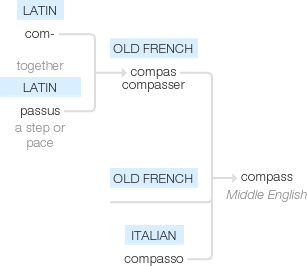Compass
Middle English: from Old French compas (noun), compasser (verb), based on Latin com- ‘together’ + passus ‘a step or pace’. Several senses (‘measure’, ‘artifice’, ‘circumscribed area’, and ‘pair of compasses’) which appeared in Middle English are also found in Old French, but their development and origin are uncertain. The transference of sense to the magnetic compass is held to have occurred in the related Italian word compasso, from the circular shape of the compass box.
wiktionary
From Middle English compas(“a circle, circuit, limit, form, a mathematical instrument”), from Old French compas, from Medieval Latin compassus(“a circle, a circuit”), from Latin com-(“together”) + passus(“a pace, step, later a pass, way, route”); see pass, pace.
From Middle English compassen(“to go around, make a circuit, draw a circle, contrive, intend”), from Old French compasser; from the noun; see compass as a noun.
etymonline
compass (n.)
c. 1300, "space, area, extent, circumference," from Old French compas "circle, radius; size, extent; pair of compasses" (12c.), from compasser "to go around, measure (with a compass); divide equally," from Vulgar Latin *compassare "to pace out," from Latin com "with, together" (see com-) + passus "a step" (from PIE root *pete- "to spread").
The mathematical instrument for describing circles was so called in English from mid-14c. The mariners' directional tool (so called since early 15c.) took the name, perhaps, because it's round and has a point like the mathematical instrument.
Meaning "limits, boundary" is from 1550s. Sense of "range of notes which a given voice or instrument can produce" is from 1590s.
The word is in most European languages, with a mathematical sense in Romance, a nautical sense in Germanic, and both in English. In Middle English it also could mean "ingenuity, subtlety, cunning." Also an adverb in Middle English: to go compass was "go in a circle, go around."
compass (v.)
c. 1300, "to devise, plan;" early 14c. as "to surround, contain, envelop, enclose;" from Anglo-French cumpasser, Old French compasser "to go around, measure (with a compass), divide equally, calculate; plan" (12c.), from Vulgar Latin *compassare "to pace out" (source of Italian compassare, Spanish compasar), from Latin com "with, together" (see com-) + passus "a step" (from PIE root *pete- "to spread"). Related: Compassed; compassing.
